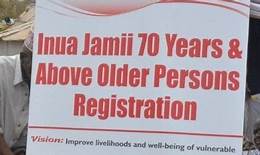Through K-YEEAP, KEPSA shall identify new and under-served sectors with the potential to generate at least five million decent and sustainable jobs by 2027.
The programme aims to support the growth of 200,000 small businesses while catalyzing the development of 10,000 start-ups through the creation of 47 County Business Hubs.
Speaking in Nairobi, Gachagua said youth unemployment currently standing at 38.9 percent was a key concern for the Kenya Kwanza government, noting that over the years, the economy had not matched the demand for jobs in the country.
“The 75 percent of our population, below the age of 35 is a big blessing to this nation. These young people want to actively participate in the development of this country, and to be at the center of decision-making. As Kenya Kwanza, we are committed to reducing bureaucracy in government by streamlining the business licensing regime, as well as unlocking other structural bottlenecks to improve public service delivery around business and entrepreneurship support,” he said.
Noting that about 5.3 million young people are unable to find decent employment in Kenya, the Deputy President said the Sh.50 billion Hustler Fund will be used to provide opportunities for trade and capacity building for youth as capital in developing and growing their enterprises.
In addressing the jobs gap in Kenya, K-YEEAP proposes to support demand-driven vocational and technical training, on-the-job learning, and real job opportunities for youth and women while also accelerating the adoption of digital technologies as a tool for job creation and economic transformation.
“Internet penetration in Kenya is one of the best in Africa. Kenya cannot, therefore, afford to be left behind in the digital revolution in creating opportunities for our young people. Our work in the public sector is therefore to ease business and facilitate the private sector to create and deliver these opportunities for our young people because the government must support business,” said Gachagua.
To accomplish the programme’s goals, KEPSA will leverage its industry knowledge and access to the supply, policy, and demand sides of the labor market to facilitate access to finance and markets, business coaching and mentorship while creating linkages for small businesses with large companies’ supply chains.
According to KEPSA CEO, Carole Kariuki, K-YEEAP will also pursue relevant and market-oriented skills for industry transformation by closely collaborating with the Technical and Vocational Education and Training (TVET) ecosystem.
K-YEEAP, she added, will also support public sector digital transformation for effective service delivery and job creation, increase digital and digitally-enabled job opportunities for young people, and help small businesses with their digital transformation.
“The main goal of KEPSA is to encourage economic development and job creation in Kenya. This initiative aims to address barriers to youth employment such as demand and absorption capacity creation, given the dual challenges of a growing youth bulge and the systemic bottlenecks that youth face when entering the labour market,” affirmed Kariuki.
K-YEEAP interventions will include opportunities for the identification of job linkage platforms in the digital economy, skills and enterprise development and employment placement initiatives. Along with promoting and coordinating private-sector TVETS, the program will also connect academia and industry for technical assistance and capacity building, policy and research advocacy as well as the dissemination of labour market data like work and career readiness.
KEPSA acknowledged the Kenya Kwanza Government’s speed and commitment to fostering a favorable business environment for small business growth, as well as the necessity of boosting private sector involvement in national development and job creation.
“We appreciate how quickly your administration has started implementing the Kenya Kwanza Manifesto agenda. We look forward to cooperating with your administration and other stakeholders in pursuing a more inclusive society, yearly enhancements Page 3 of 4 in the general business environment, and Kenya’s global competitiveness,” Kariuki said.
K-YEEAP is the latest in a line of successful KEPSA programs, in collaboration with government, and development partners designed to transform Kenya’s economy by boosting the capacity of small businesses and generating employment opportunities.
These include initiatives such as the Covid-19 Resilience and Recovery Program for Businesses, the Private Sector Tree Planting Initiative, the Kenya Youth Empowerment Project, the ongoing Ajira Digital Program, the Mkenya Daima Initiative.
Also launched at the event was the ‘Pamoja Tuungane’ drought initiative Call to Action, which has a renewed focus on mid-term intervention on policy and longterm intervention through investments, to mitigate the cyclic effects of recurrent drought, in addition to the ongoing emergency food and cash donations.
The one-year private sector program spearheaded by KEPSA, Safaricom and other Corporates brings together the private sector, development partners and other stakeholders to complement the government’s efforts in responding to the current drought situation in the country.
This includes supporting in due time, school feeding and livestock assets recovery and re-stocking programs while exploring ways to create resilient livelihoods for the largely pastoral communities living in Arid and Semi-Arid Lands (ASAL) regions. An estimated 4.5 million people across 23 counties in Kenya are faced with severe food shortages as of October 2022.
At the event, the Deputy President received Sh.283 million in both cash and inkind commitments from private sector players and partners including Safaricom PLC, Optiven Limited, Elgon Kenya Limited, Bedi Investments, The Agriculture Sector Network, Melvins Tea and Aramex Logistics Company. Others are Bayer Limited, Trinity Petroleum Limited, Rotary, Dow Chemicals and The Chandaria Foundation.
Calling for more localized and long-lasting solutions such as setting up dams in hardhit communities, stakeholders at the event urged for enhanced partnership with the national government and line ministries as well as county governments in food distribution.
